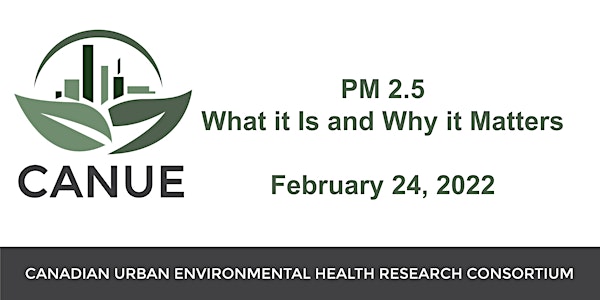
Expert Webinar Series
PM 2.5: What it Is and Why it Matters
Date and time
Location
Online
About this event
In 2021, recognizing the health burden of exposure to fine particulate matter (PM2.5), the World Health Organization cut its guideline for annual average exposure in half. Now 86% of Canadians live in areas that exceed the new WHO guideline. Exposure to air pollution is estimated to cause 7 million deaths every year, and exposure to PM2.5 in particular has been linked with premature death in people with heart or lung disease, nonfatal heart attacks, aggravated asthma, decreased lung function and coughing or difficulty breathing.
Understanding what PM2.5 is, where it comes from, how it’s measured and its effect on health can help public health professionals better manage the health risks it presents to everyone, and health researchers better use relevant and meaningful datasets to understand its health effects.
This webinar will:
- Review the sources and composition of PM2.5, and behaviour that leads to spatial and temporal patterns
- Discuss how satellite-based data is created and used
- Review datasets available through CANUE and University of Washington in St. Louis, and discuss which sets are recommended for environmental health research
Jeff Brook is a Scientific Director of the Canadian Urban Environmental Health Research Consortium, as well as Assistant Professor at the Dalla Lana School of Public Health and the Department of Chemical Engineering and Applied Chemistry at the University of Toronto. He has 25 years of experience as an Environment Canada scientist working at the science-policy interface. During this time he spent 15 years as faculty at the University of Toronto, where he was involved in research, lecturing and graduate student training. He is one of Canada’s leading experts in air quality, recognized at all levels of government and academically, including for his substantial contributions in air pollution health research. Dr. Brook has led scientific assessments to inform policy nationally and internationally, and advised multi-stakeholder groups shaping policy. He has led a variety of multi-disciplinary research teams in government, government-academic partnerships and in academia. Recently his efforts have expanded beyond air quality, for example for 8 years he has led the Environmental Working Group of the Canadian Health Infant Longitudinal Development (CHILD) study and co-led the Gene x Environment Research Platform within the AllerGen Network of Centres of Excellence.
Aaron van Donkelaar is a Research Associate with the Atmospheric Composition Analysis Group at Washington University in St. Louis. His research combines satellite retrievals with chemical transport model simulations to estimate fine aerosol concentrations around the world. This work is being used to provide valuable insight into exposure-related health effects in regions where these concentrations are not monitored directly, which include some of the most heavily populated and polluted places on earth.